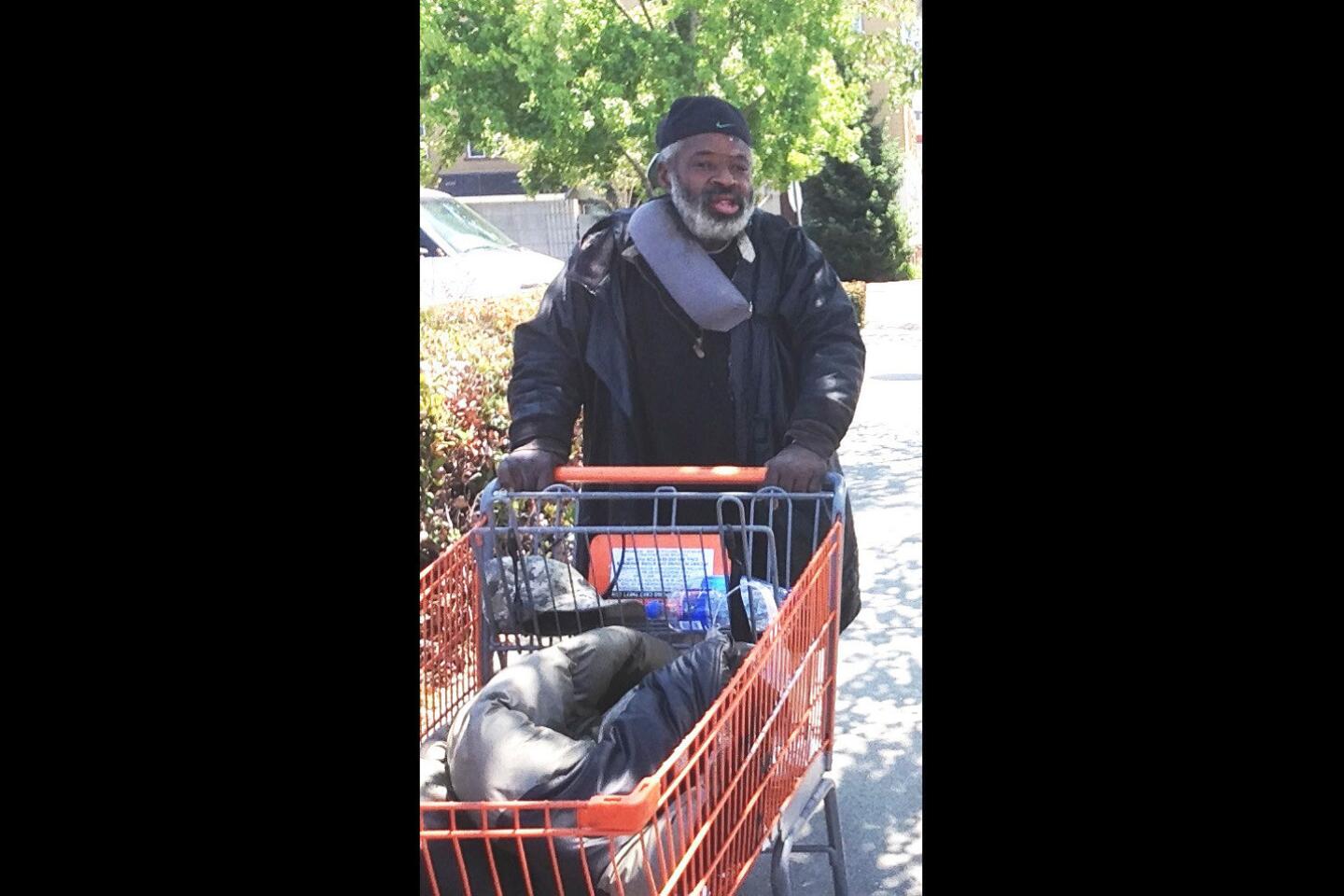Great Read: ‘Miss Kay,’ broken by loss, finds love and care at life’s end
- Share via
reporting from OAKLAND — A small, stuffed pink elephant rests in the crook of Hayok Kay’s arm. A ventilator tube snakes down her throat. After 61 years, her life has come to this: Bleeding on both sides of the brain. A broken nose, eye socket and ribs. A punctured lung. And, beneath all that damage, cancer.
Patients like Kay arrive often at Alameda County’s public hospital and trauma center, unable to make their own care decisions. Many have lived on the streets for years. Once they’re stabilized, the search begins — for estranged family members, or for a “surrogate,” someone who knows what they might have wanted at the end.
Those with no one have a label in the literature of medical ethics: “The unbefriended.”
But “Miss Kay,” 4 feet 10 and shy of 100 pounds, with a big heart and a foul mouth, was anything but.
Kay was uncompromising, given to furies if told what to do. She could be a public nuisance when drunk, which was often. She suffered occasional bouts of psychosis. But with those she trusted, she was generous and gentle, prone to giggling in her oddly pitched child’s voice.
Mostly she was broken by loss, and drawn to love — again and again.
At Highland Hospital’s intensive-care unit, Amir Soltani massages her ear and strokes her arm. He smooths her thinning hair. She appears to stare at him intently with one eye, but when he asks her to track his finger or respond to commands, she cannot.
Soltani is a documentary filmmaker. Eight years ago, Miss Kay became one of his subjects. Then an abiding affection took hold.
He, hospital officials agree, will be her surrogate.
“Do you want to be with your dad, and Fred, and Al?” the 49-year-old filmmaker asks her softly. “Is that what you want?”
::
Kay’s father was a South Korean army colonel. His wife had borne him a daughter but could have no more children, so with her knowledge he took a mistress and tried for a boy. He got a girl.
In an early memory, Kay is standing on a tarmac at age 3 as the family prepares to move to Tokyo.
Her stepmother and birth mother push her back and forth, arguing violently: “You take her.” “No, you take her.”
It stayed with Kay, said Ward Abronski, her longtime love and musical collaborator, who heard the story over and over.
Abronski described Kay as “one of the most emotionally needy people I have ever met” — soft on the inside with an outer shell that was “hard as nails.”
“She had such a deep-seated fear of abandonment and a feeling of being unwanted and unloved,” said Abronski, 65. “I don’t think she was able to come to terms with that her entire life.”
When Kay was in her early teens the family immigrated to San Francisco, settling in an apartment near Coit Tower in North Beach. Abronski met her when she was in her mid-20s. They moved in together and helped run her family’s deli. In 1980, Abronski bought her a starter drum set, impressed with the “rock solid beat” she could keep. Soon, Polkacide, a band they dreamed up as a one-night novelty, found a niche in the West Coast punk scene with its raucous horns, accordions and black leather lederhosen.
Early footage in Soltani’s film, “Dogtown Redemption,” shows a stunning, smiling Kay: With a petticoat on her head. A cigarette dangling from her lips. Exuberant at her drum set.
But in the late 1980s, feeling smothered, Abronski ended the relationship — and they both fell apart.
He turned to heroin for two years, Kay to speed. She banged pots and pans at practice and was edged out of the band.
“Luckily I was able to swim back,” Abronski said. “She never made it. … I knew that if she didn’t have someone to catch her, she wouldn’t get up.”
::
Kay’s father slipped her money as she slid. But he died in 1998. Not long after, she paired up with Fred Griffing III, an outsider artist who painted landscapes and portraits and sold them on the street.
He offered her love and safety. She worked her recycling route. They lived in his car. They drank.
But in 2010, Griffing suffered liver and kidney failure and died. Soon she was sleeping behind an Emeryville Office Depot.
Bouts of alcohol-related pancreatitis landed her in the hospital. Hope came in December 2012, when she secured a bed at a winter shelter at Oakland’s St. Mary’s Center. Shortly after her arrival, she raised a flower to Griffing at an annual memorial for those who have died on the street — and sobbed. She helped out with chores. But complaints about her confrontational nature trickled in weekly.
“I’d say to her, ‘Help me to help you stay here, ‘“ said Shirley Cheney, program director of homeless senior services who as a case manager did Kay’s lengthy intake. “We’d laugh. It was always Miss Kay dealing with Miss Kay.”
When she was caught with a full bottle of vodka, she was told she had to go. If Kay agreed to attend 12-step meetings for seniors, she could earn her way back. But she wasn’t interested.
“Sometimes, there is so much trauma,” Cheney said. “If you can’t give them more hope than they get from that bottle or the syringe, that’s all they’ve got.”
Kay found love again. In one of the documentary’s final scenes, a doting man holds her head in his lap and croons, “You ain’t gotta worry about Al leaving you. You hear me? Al gonna be laying right beside you.”
They moved to People’s Park, in Berkeley, and Al Smith bought her a small drum. They’d fight. He’d leave. He’d come back. But about a year ago he didn’t. Kay would learn he died three months later of complications related to hepatitis C.
Back in Emeryville, she staked out a sleeping spot in front of the CVS pharmacy, where the lights and traffic helped her feel safe. She told new friends to call her “Mimi.” One of them was Corrine McDonald, a singer-songwriter who lives in subsidized senior housing across the street. McDonald would bring Mimi home-cooked chicken and rice and buy her caramel Nips, her favorite candy. Sometimes, they listened to music. All kinds of music.
“You could tell by the way she talked that she was an intelligent person,” said McDonald, 73. “She was just compromised, physically and mentally.”
Last spring, doctors discovered a large tumor in Kay’s left breast. Biopsy results confirmed cancer, and a PET scan was scheduled.
But when Soltani went to CVS the day before to tell Miss Kay to drink plenty of water, he found crime scene tape and one of her homeless friends, weeping.
::
Earlier that morning, Emeryville Police Officer Jason Krimsky, who has known Kay since the late 1990s, sat across an interview table from her assailant.
Christopher Flores still smelled of alcohol. Slight at 5 feet 9 and and 155 pounds, the 37-year-old had already admitted at the scene to beating Kay and now did so again, saying repeatedly that Kay had threatened to kill him.
“What was I supposed to do?” the police report notes him protesting. “I had to defend myself.”
He showed Krimsky a scar on his head. Eighteen years ago, a gang member had beaten him with a tire iron in a Novato park, fracturing his skull in six places and leaving him in a coma. Kay, he said, had “scared” him into thinking it was happening again.
Flores takes seizure medication as a result of his brain injury and is supposed to avoid alcohol, a friend said. But surveillance footage showed him buying liquor, stumbling to urinate in a doorway and walking toward the CVS with an unsteady gait. Shortly before 2:30 a.m., he approached the shuttered store to try to buy gum, he told police. Flores said Kay grabbed his ankles, swore at him and said she would kill him.
He fell, got up and kicked her “one time,” he told Krimsky, then returned to “apologize.” But a patrol officer who noticed Flores standing over her found a scene of great violence: Kay was tucked in her sleeping bag. Blood pooled beneath her swollen head, had spattered onto the store window and covered Flores’ right shoe. She was moaning.
Flores, Krimsky theorized in an interview, likely stumbled on her. She flipped out. So did he.
::
By early August, Highland Hospital’s medical team told Soltani there was virtually no chance Kay would get better. Living would probably mean remaining on the ventilator and feeding tube as her cancer spread.
Like most people who live on the street, Kay had no advance care directive. So Soltani searched his memory for clues to her wishes — the time she had taken an injured bird to be euthanized, her growing exhaustion and despair.
He brought Curtis Trahan to visit. He was Kay’s latest protector, cooking ribs for her on a grill in the bushes behind CVS. He had tried to get her to sleep back there, but she felt safer closer to the street.
“Mimi, Mimi, come on back to your big brother,” he begged. “I miss the laughter that we always had. … I love you with all my heart.”
Kay’s estranged older sister agreed that Soltani should serve as surrogate. When he made his decision, she approved: The ventilator and feeding tube came out.
At a hospice program in an Alameda nursing home, Abronski went to see her. So did McDonald.
“She was loved,” McDonald said. “That’s all I can say, very much loved.”
::
On Aug. 18, Miss Kay died.
Soltani took her ashes to her father’s gravestone in Colma, then to Fred’s at Oakland’s Mountain View Cemetery. Then, with Abronski and the film’s associate producer, they scattered her in the bay.
Flores is expected to enter a plea to a murder charge on Monday.
St. Mary’s Center will hold its annual memorial on Dec. 9 for those lost to the streets. This time, Kay will be remembered.
The center has a small pile of advance care directives on file for clients, and case workers gently raise the ever-present topic of death and dying when appropriate. Cheney never had that conversation with Miss Kay, but believes Soltani made the right choice.
“I think,” she said, “that death was a welcomed friend to her.”
Twitter: @leeromney
MORE GREAT READS
A shadow hangs over Mexico’s ‘magical city’ of Ocotlan
Nuclear accord paves way for importing Persian rugs into U.S. again
More to Read
Sign up for Essential California
The most important California stories and recommendations in your inbox every morning.
You may occasionally receive promotional content from the Los Angeles Times.












